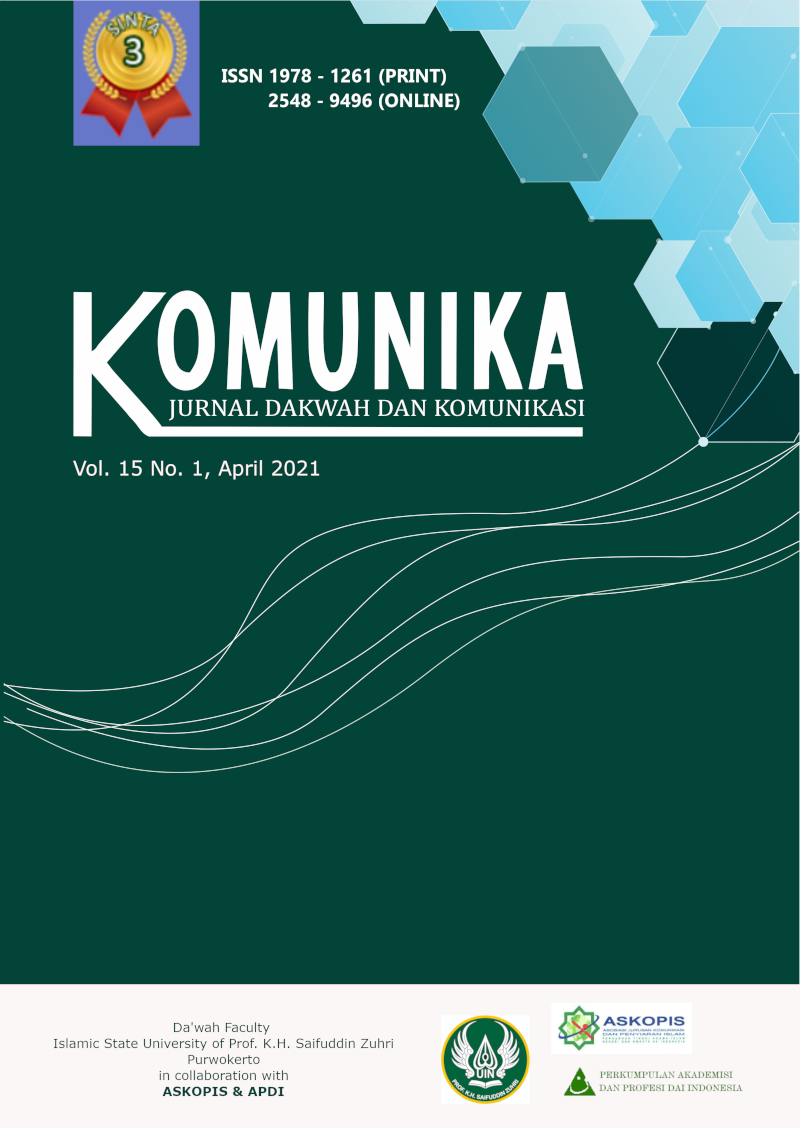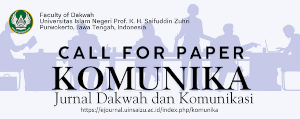The Level of Religion Radicalism Understanding Among University Students in Banyumas Region
DOI:
https://doi.org/10.24090/komunika.v15i1.4169Keywords:
Level of Understanding, University student, Religious RadicalismAbstract
Students as the nation’s next-generation and the academic community should have a global understanding of religious radicalism danger. However, recently, many national mass media have reported about the radical ideological infiltration targeting university students. The understanding level of religious radicalism among university students can be a consideration in mapping the potential for the spread of radical ideology. However, there are indications that many students understand religious radicalism. This study aims to determine and analyse the level of understanding of re- religious radicalism among university students in the Banyumas region. Research respondents totalled 350 people from four universities in the Banyumas region. The data collection method was through a closed questionnaire. The basis of the composition of the questionnaire question items is Bloom’s Taxonomy levels C1 and C2. The correct answer point is four, and the wrong answer is 0. The researcher divided the respondents’ understanding level into three categories: high, medium, and low. The results showed that understanding religious radicalism in students studying exact sciences was 67.54%. The understanding stage of religious radicalism in students studying social science was in the range of 67.89%. University students in the Banyumas region have an average of 67.71% or are in the medium category with a low threshold score.Downloads
Download data is not yet available.
References
Abdi, A. P. (2019). Setara Institute Sebut 10 Kampus Terpapar Paham Radikalisme. www.Tirto.Id. https://tirto.id/setarainstitute-sebut-10-kampus-terpaparpaham-radikalisme-d9nh
Abdullah, A. (2016). Gerakan Radikalisme Dalam Islam: Perspektif Historis. Addin,10(1), 1. https://doi.org/10.21043/addin.v10i1.1127
Arif, S. (2016). Islam, Radikalisme dan Deradikalisasi Berbasis Pancasila. Societas Dei, 3(2), 240–266
Aryanti, Z., Mustofa, I., Irwansyah, D., & Walfajri. (2015). Persepsi dan Resistensi Aktivis Muslim Kampus Terhadap Paham dan Gerakan Islam Radikal: Kasus Perguruan Tinggi di Provinsi Lampung. Penamas, 28(September).
Bakri, M., & Saidi, A. (2017). Peta Radikalisme Agama di Indonesiaanalisis Kritis Terhadap Dinamika Politik Mahasiswa Dan Masa Depan Demokrasi Di Indonesia. International Seminar on Islamic Civilization, 59–87.
Bakri, M., & Saidi, A. (2017). Peta Radikalisme Agama di Indonesiaanalisis Kritis Terhadap Dinamika Politik Mahasiswa Dan Masa Depan Demokrasi Di Indonesia. International Seminar on Islamic Civilization, 59–87.
Conway, M. (2016). Determining the Role of the Internet in Violent Extremism and Terrorism: Six Suggestions for Progressing Research. Studies in Conflict and Terrorism, 40(1), 77–98. https://doi.org/10.1080/1057610X.2016.1157408
Gade, S., & Hj Don, A. G. (2015). Model Dakwah: Satu Analisis Teoritikal. Ê»UlÅ«m IslÄmiyyah Journal, 2010(16), 23–41. https://doi.org/10.12816/0028490
Ghifari, I. F. (2017). Radikalisme di Internet. 2(1), 123–134. https://doi.org/10.15575/jw.v39i1.575
Golose, P. R. (2010). Deradikalisasi Terorisme Humanis, Soul Approach dan Menyentuh Akar Rumput. YPKIK
Hartono, D. (2016). Persepsi Santri Pondok Pesantren Langitan Tuban Tentang Radikalisme Di Indonesia. Kajian Moral Dan Kewarganegaraan, 2(4), 327–336.
Hinds, J., & Joinson, A. N. (2017). Radicalisation, Internet and Cybersecurity: Opportunities and Challenges for HCI. School of Management, 1(May), 191–211. https://doi.org/10.1007/978-3-319-58460-7
Jafar, T. F., Sudirman, A., & Rifawan, A. (2019). Ketahanan Nasional Menghadapi Ancaman Lone Wolf Terrorism Di Jawa Barat. Journal of National Defence, 25(1), 73. https://doi.org/10.22146/jkn.41244
Khamid, N. (2016). Bahaya Radikalisme terhadap NKRI. Millati: Journal of Islamic Studies and Humanities, 1(1), 123. https://doi.org/10.18326/mlt.v1i1.123-152
Mealer, M. J. (2012). Internet Radicalisation: Actual Threat or Phantom Menace?
Panuju, R. (2019). Perjalanan Wacana Jokowi Dalam Pencalonannya Sebagai Kandidat Presiden 2019-2024. Komuniti: Journal of Information Technology and Communication, 10(2), 149–164. https://doi.org/10.23917/komuniti.v10i2.6753
Purwanto, Y., & Khoiri, S. (2016). Studi Agama & Etika Islam dan Keberagamaan Mahasiswa “Z’’ Generation: Kajian di Lingkungan Kampus ITB Bandung.â€Walisongo: Journal of Religious Social Research, 24(2), 423. https://doi.org/10.21580/ws.24.2.1182
Republika. (2020). Selama Covid 19, Pengguna Internet di Rumah Meningkat Pesat. https://republika.co.id/berita/qdim8u6217000/selama-covid19-penggunaan-internet-di-rumahmeningkat-pesat
Sadiah, D. (2018). Strategi Dakwah Penanaman Nilai-nilai Islam dalam Menangkal Paham Radikalisme di Kalangan Mahasiswa. Anida: Aktualisasi Nuansa Ilmu Dakwah, Vol. 18(2), 219–238.
Sahri. (2016). Radikalisme Islam di Perguruan Tinggi Perspektif Politik Islam. AlDaulah: Journal of Law and Islamic Legislation, 6(1), 237–268.
Said, M. (2018). Dakwah sebagai Ujung Tombak Penanganan Radikalisme Agama Di Indonesia. Tasamuh: Jurnal of Islamic Studies, 10(1), 149–187. https:// doi.org/10.32489/tasamuh.51
Saifuddin. (2011). Radikalisme Islam di Kalangan Mahasiswa (Sebuah Metamorfosa Baru). Analisis, XI, 17–32.
Saifulah. (2014). Dakwah Multikulturalisme Pesantren Ngalah Dalam Meredam Radikalisme Agama. ISLAMICA: Journal of islamic Studies, 8(2), 421–446.
Spaaij, R., & Hamm, M. S. (2015). Key Issues and Research Agendas in Lone Wolf Terrorism. Studies in Conflict and Terrorism, 38(3), 167–178. https://doi.org/10.1080/1057610X.2014.986979
Subhan, M. (2016). Pergeseran Orientasi Gerakan Terorisme Islam di Indonesia (Studi Terorisme Tahun 2000-2015). Journal of International Relations, 2(September 2001), 59–67. http:// ejournal-s1.undip.ac.id/index.php/jihi
Sudaryono. (2012). Dasar-Dasar Evaluasi Pembelajaran. Graha Ilmu.
Syafei, I. (2018). Pengaruh Tingkat Pengetahuan Agama Terhadap Persepsi Mahasiswa Pada Gerakan Radikalisme Berbasis Agama (Studi Pada Mahasiswa UIN Raden Intan Lampung). AlTadzkiyyah: Journal of Islamic Education, 9(1), 61–79.
Widyaningsih, R. (2014). Bahasa Ngapak dan Mentalitas Orang Banyumas: Tinjauan dari Perspektif Filsafat Bahasa Hans-Georg Gadamer. Ultima Humaniora, II(1), 186–200.
Widyaningsih, R. (2017). Dimensi Sosial dan Religi Kearifan Lokal Banyumas. LPPM Unsoed.
Widyaningsih, R. (2019). Deteksi Dini Radikalisme. Unsoed Press.
Widyaningsih, R., & Kuntarto, K. (2018). Family Suicide Bombing: A Psychological Analysis of Contemporary Terrorism. Walisongo: Journal of Religious Social Research, 26(2), 295. https://doi. org/10.21580/ws.26.2.3111
Widyaningsih, R., & Kuntarto, K. (2020). Determinan Keterlibatan Perempuan dalam Gerakan Radikalisme. MATAN: Journal of Islam and Muslim Society, 2(1), 40–56. https://doi.org/https://doi. org/10.20884/1.matan.2020.2.1.2251
Widyaningsih, R., Sumiyem, & Kuntarto. (2017a). Kerentanan Radikalisme agama dikalangan anak muda. Proceedings of National Seminar and Call for Papers â€Pengembangan Sumber Daya Perdesaan Dan Kearifan Lokal Berkelanjutan, 6, 1553–1562. https://doi.org/10.1088/1755- 1315/255/1/012049
Widyaningsih, R., Sumiyem, & Kuntarto. (2017b). The Potential Of Religious Radicalism Movement In Banyumas. Walisongo, 25(1), 203–230. https://doi. org/10.21580/ws.25.1.1807
Widyaningsih, R., Sumiyem, S., & Kuntarto, K. (2017c). The Potential of Religious Radicalism Movement in Banyumas. Walisongo: Journal of Religious Social Research 25(1), 203. https://doi. org/10.21580/ws.25.1.1807
Zinchenko, Y. P., Perelygina, E. B., & Zotova, O. Y. (2016). Perceptions of Extremism in the Youth Daily Consciousness. Procedia - Social and Behavioral Sciences, 233(May), 322–326. https://doi. org/10.1016/j.sbspro.2016.10.144
Abdullah, A. (2016). Gerakan Radikalisme Dalam Islam: Perspektif Historis. Addin,10(1), 1. https://doi.org/10.21043/addin.v10i1.1127
Arif, S. (2016). Islam, Radikalisme dan Deradikalisasi Berbasis Pancasila. Societas Dei, 3(2), 240–266
Aryanti, Z., Mustofa, I., Irwansyah, D., & Walfajri. (2015). Persepsi dan Resistensi Aktivis Muslim Kampus Terhadap Paham dan Gerakan Islam Radikal: Kasus Perguruan Tinggi di Provinsi Lampung. Penamas, 28(September).
Bakri, M., & Saidi, A. (2017). Peta Radikalisme Agama di Indonesiaanalisis Kritis Terhadap Dinamika Politik Mahasiswa Dan Masa Depan Demokrasi Di Indonesia. International Seminar on Islamic Civilization, 59–87.
Bakri, M., & Saidi, A. (2017). Peta Radikalisme Agama di Indonesiaanalisis Kritis Terhadap Dinamika Politik Mahasiswa Dan Masa Depan Demokrasi Di Indonesia. International Seminar on Islamic Civilization, 59–87.
Conway, M. (2016). Determining the Role of the Internet in Violent Extremism and Terrorism: Six Suggestions for Progressing Research. Studies in Conflict and Terrorism, 40(1), 77–98. https://doi.org/10.1080/1057610X.2016.1157408
Gade, S., & Hj Don, A. G. (2015). Model Dakwah: Satu Analisis Teoritikal. Ê»UlÅ«m IslÄmiyyah Journal, 2010(16), 23–41. https://doi.org/10.12816/0028490
Ghifari, I. F. (2017). Radikalisme di Internet. 2(1), 123–134. https://doi.org/10.15575/jw.v39i1.575
Golose, P. R. (2010). Deradikalisasi Terorisme Humanis, Soul Approach dan Menyentuh Akar Rumput. YPKIK
Hartono, D. (2016). Persepsi Santri Pondok Pesantren Langitan Tuban Tentang Radikalisme Di Indonesia. Kajian Moral Dan Kewarganegaraan, 2(4), 327–336.
Hinds, J., & Joinson, A. N. (2017). Radicalisation, Internet and Cybersecurity: Opportunities and Challenges for HCI. School of Management, 1(May), 191–211. https://doi.org/10.1007/978-3-319-58460-7
Jafar, T. F., Sudirman, A., & Rifawan, A. (2019). Ketahanan Nasional Menghadapi Ancaman Lone Wolf Terrorism Di Jawa Barat. Journal of National Defence, 25(1), 73. https://doi.org/10.22146/jkn.41244
Khamid, N. (2016). Bahaya Radikalisme terhadap NKRI. Millati: Journal of Islamic Studies and Humanities, 1(1), 123. https://doi.org/10.18326/mlt.v1i1.123-152
Mealer, M. J. (2012). Internet Radicalisation: Actual Threat or Phantom Menace?
Panuju, R. (2019). Perjalanan Wacana Jokowi Dalam Pencalonannya Sebagai Kandidat Presiden 2019-2024. Komuniti: Journal of Information Technology and Communication, 10(2), 149–164. https://doi.org/10.23917/komuniti.v10i2.6753
Purwanto, Y., & Khoiri, S. (2016). Studi Agama & Etika Islam dan Keberagamaan Mahasiswa “Z’’ Generation: Kajian di Lingkungan Kampus ITB Bandung.â€Walisongo: Journal of Religious Social Research, 24(2), 423. https://doi.org/10.21580/ws.24.2.1182
Republika. (2020). Selama Covid 19, Pengguna Internet di Rumah Meningkat Pesat. https://republika.co.id/berita/qdim8u6217000/selama-covid19-penggunaan-internet-di-rumahmeningkat-pesat
Sadiah, D. (2018). Strategi Dakwah Penanaman Nilai-nilai Islam dalam Menangkal Paham Radikalisme di Kalangan Mahasiswa. Anida: Aktualisasi Nuansa Ilmu Dakwah, Vol. 18(2), 219–238.
Sahri. (2016). Radikalisme Islam di Perguruan Tinggi Perspektif Politik Islam. AlDaulah: Journal of Law and Islamic Legislation, 6(1), 237–268.
Said, M. (2018). Dakwah sebagai Ujung Tombak Penanganan Radikalisme Agama Di Indonesia. Tasamuh: Jurnal of Islamic Studies, 10(1), 149–187. https:// doi.org/10.32489/tasamuh.51
Saifuddin. (2011). Radikalisme Islam di Kalangan Mahasiswa (Sebuah Metamorfosa Baru). Analisis, XI, 17–32.
Saifulah. (2014). Dakwah Multikulturalisme Pesantren Ngalah Dalam Meredam Radikalisme Agama. ISLAMICA: Journal of islamic Studies, 8(2), 421–446.
Spaaij, R., & Hamm, M. S. (2015). Key Issues and Research Agendas in Lone Wolf Terrorism. Studies in Conflict and Terrorism, 38(3), 167–178. https://doi.org/10.1080/1057610X.2014.986979
Subhan, M. (2016). Pergeseran Orientasi Gerakan Terorisme Islam di Indonesia (Studi Terorisme Tahun 2000-2015). Journal of International Relations, 2(September 2001), 59–67. http:// ejournal-s1.undip.ac.id/index.php/jihi
Sudaryono. (2012). Dasar-Dasar Evaluasi Pembelajaran. Graha Ilmu.
Syafei, I. (2018). Pengaruh Tingkat Pengetahuan Agama Terhadap Persepsi Mahasiswa Pada Gerakan Radikalisme Berbasis Agama (Studi Pada Mahasiswa UIN Raden Intan Lampung). AlTadzkiyyah: Journal of Islamic Education, 9(1), 61–79.
Widyaningsih, R. (2014). Bahasa Ngapak dan Mentalitas Orang Banyumas: Tinjauan dari Perspektif Filsafat Bahasa Hans-Georg Gadamer. Ultima Humaniora, II(1), 186–200.
Widyaningsih, R. (2017). Dimensi Sosial dan Religi Kearifan Lokal Banyumas. LPPM Unsoed.
Widyaningsih, R. (2019). Deteksi Dini Radikalisme. Unsoed Press.
Widyaningsih, R., & Kuntarto, K. (2018). Family Suicide Bombing: A Psychological Analysis of Contemporary Terrorism. Walisongo: Journal of Religious Social Research, 26(2), 295. https://doi. org/10.21580/ws.26.2.3111
Widyaningsih, R., & Kuntarto, K. (2020). Determinan Keterlibatan Perempuan dalam Gerakan Radikalisme. MATAN: Journal of Islam and Muslim Society, 2(1), 40–56. https://doi.org/https://doi. org/10.20884/1.matan.2020.2.1.2251
Widyaningsih, R., Sumiyem, & Kuntarto. (2017a). Kerentanan Radikalisme agama dikalangan anak muda. Proceedings of National Seminar and Call for Papers â€Pengembangan Sumber Daya Perdesaan Dan Kearifan Lokal Berkelanjutan, 6, 1553–1562. https://doi.org/10.1088/1755- 1315/255/1/012049
Widyaningsih, R., Sumiyem, & Kuntarto. (2017b). The Potential Of Religious Radicalism Movement In Banyumas. Walisongo, 25(1), 203–230. https://doi. org/10.21580/ws.25.1.1807
Widyaningsih, R., Sumiyem, S., & Kuntarto, K. (2017c). The Potential of Religious Radicalism Movement in Banyumas. Walisongo: Journal of Religious Social Research 25(1), 203. https://doi. org/10.21580/ws.25.1.1807
Zinchenko, Y. P., Perelygina, E. B., & Zotova, O. Y. (2016). Perceptions of Extremism in the Youth Daily Consciousness. Procedia - Social and Behavioral Sciences, 233(May), 322–326. https://doi. org/10.1016/j.sbspro.2016.10.144
Downloads
Published
2021-04-01
Issue
Section
Articles
License
Authors who publish with this journal agree to the following terms:
- Authors retain copyright and grant the journal right of first publication with the work simultaneously licensed under a Creative Commons Attribution-ShareAlike 4.0 International License that allows others to share the work with an acknowledgement of the work's authorship and initial publication in this journal.
- Authors are able to enter into separate, additional contractual arrangements for the non-exclusive distribution of the journal's published version of the work (e.g., post it to an institutional repository or publish it in a book), with an acknowledgement of its initial publication in this journal.
- Authors are permitted and encouraged to post their work online (e.g., in institutional repositories or on their website) prior to and during the submission process, as it can lead to productive exchanges, as well as earlier and greater citation of published work (See The Effect of Open Access).

























